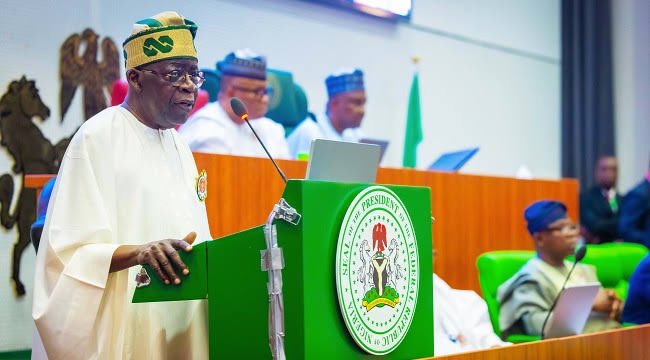By Hadeezah Musa
Abuja, Nigeria–President Bola Tinubu has formally requested the National Assembly to consider a significant N6.2 trillion increase in the 2024 appropriation act. This move, aimed at propelling Nigeria’s infrastructure development and maintaining governmental operations, underscores the administration’s commitment to revitalizing the nation’s economic landscape.
The request was conveyed through a letter read aloud by Senate President Godswill Akpabio during the Wednesday session in the upper legislative chamber. This proposal marks a substantial hike in the 2024 budget, elevating it to N34.9 trillion from the original N28.7 trillion budget approved by President Tinubu on January 1st.
Infrastructure and Recurrent Expenditure Focus
President Tinubu’s budget revision is strategically allocated with N3.2 trillion earmarked for critical infrastructure initiatives and another N3 trillion designated for ongoing recurrent expenses. This dual approach highlights the administration’s prioritization of both immediate operational needs and long-term developmental goals.
“Pursuant to section 58 (2) of the Constitution of the Federal Republic of Nigeria as amended, I forward herewith the above-named bills for consideration and passage by the Senate,” stated President Tinubu in his letter.
He emphasized the importance of these amendments, describing the allocation of N3.2 trillion for Renewed Hope Infrastructure Projects as essential for the nation’s development.
These projects, spanning across the country, are expected to significantly enhance Nigeria’s infrastructure, promoting economic growth and improving the quality of life for its citizens.
Funding the Vision: One-Time Windfall Tax
To finance these ambitious projects, President Tinubu proposed amendments to the Finance Acts 2023, which include a one-time windfall tax on the foreign exchange gains realized by banks in their 2023 financial statements. This innovative funding mechanism is designed to harness financial gains from the banking sector to fuel capital infrastructure development, education, healthcare, and welfare initiatives—key components of the Renewed Hope Agenda.
“Furthermore, the proposed amendments to the Finance Acts 2023 are required to impose a one-time windfall tax on the foreign exchange gains realized by banks in their 2023 financial statements to fund capital infrastructure development, education, and healthcare as well as welfare initiatives,” the president elaborated.
Implications for Nigeria’s Future
This budget increase proposal signifies a bold step towards transforming Nigeria’s economic and social landscape. By channeling substantial funds into infrastructure, the Tinubu administration aims to address long-standing deficits in the nation’s roads, bridges, and public facilities, creating a more conducive environment for business and daily life.
Moreover, the focus on recurrent expenditure ensures that governmental operations remain smooth and efficient, supporting essential services that the Nigerian populace relies on. The strategic use of a windfall tax demonstrates a pragmatic approach to fiscal policy, leveraging unexpected financial gains to fund critical national projects without imposing additional burdens on the general populace.
Legislative Path Ahead
As the National Assembly deliberates on this substantial budget amendment, all eyes are on the potential impacts of these proposed changes. The legislative decision will be pivotal in determining the trajectory of Nigeria’s development over the coming years.




